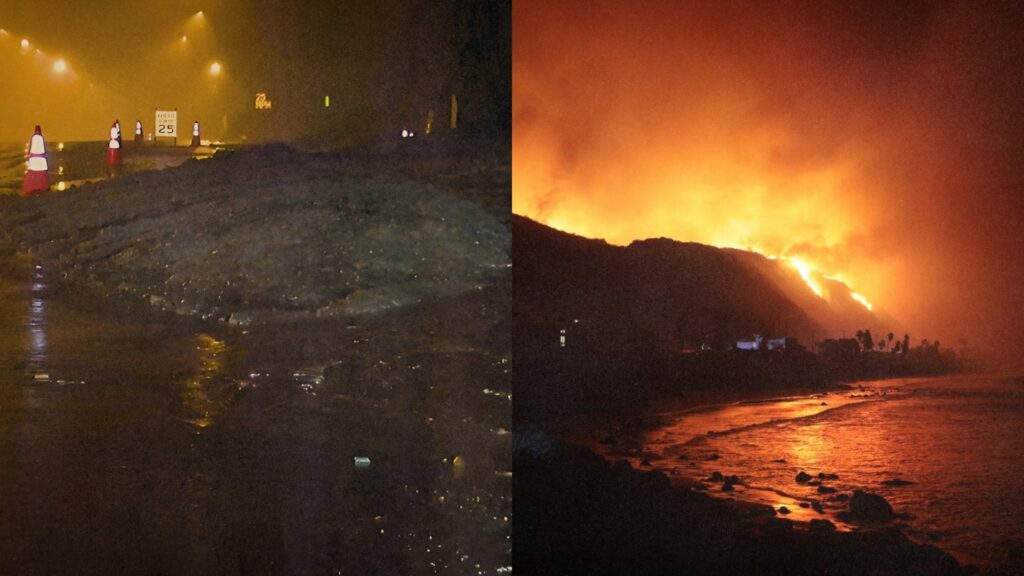
Introduction
The recent Pacific Palisades fires and mudslides have caused significant destruction, displacing residents and leaving behind serious health risks. While the immediate physical damage is evident, the long-term effects on respiratory health, mental well-being, and overall public health are just beginning to surface.
This article explores the wildfire smoke health effects, the impact of mudslides on public health, and the increasing prevalence of mental illness and posttraumatic stress disorder (PTSD) following stressful events.
Understanding the Disaster
Overview of the Pacific Palisades Fires and Mudslides
The Pacific Palisades Fires and Mudslides were a series of catastrophic natural disasters that struck the Pacific Palisades region. Fueled by strong winds and dry conditions, the fires ravaged thousands of acres, obliterating homes and businesses in their path.
The devastation didn’t end there; heavy rainfall soon followed, triggering mudslides that caused further destruction and loss of life. These events left an indelible mark on the community, leading to significant emotional and psychological trauma.
The scale of the disaster was immense, and the community continues to grapple with the aftermath, both physically and mentally.
Respiratory Health Concerns from Wildfire Smoke and Poor Air Quality

One of the biggest health risks following a disaster is respiratory distress caused by prolonged wildfire smoke exposure.
Fine particles and particulate matter from air pollution can penetrate deep into the lungs and enter the bloodstream, leading to lung diseases, cardiovascular disease, and respiratory conditions.
Who Is Most at Risk?
Older adults and children and adolescents
Individuals with asthma, COPD, or preexisting lung diseases
Those in sensitive groups with heart disease or respiratory problems
Common Symptoms of Smoke Inhalation
Shortness of breath and chest pain
Irritation of the throat, headaches, and eye discomfort
Increased risk of lung function decline
Fatigue, dizziness, and trouble breathing
Contaminated Water and Health Risks
Following the Pacific Palisades fires and even the mudslides, many residents have reported drastic changes in water pH levels in their homes. This contamination poses serious health risks, as altered water chemistry can lead to:
Gastrointestinal issues, including nausea and stomach pain.
Skin irritation and rashes due to chemical imbalances.
Heavy metal exposure, increasing the risk of long-term toxicity.
Corrosion of plumbing systems, further introducing contaminants into household water supplies.
How PointHealth Can Help
If you have ingested contaminated water, your body may need additional support to flush out toxins and restore balance. PointHealth offers specialized IV therapy treatments to help detoxify and rehydrate your system effectively:
IV Hydration Therapy: Helps replenish lost fluids, electrolytes, and essential nutrients that may be disrupted by water contamination.
Detox IV Therapy: A combination of antioxidants like glutathione and vitamin C to aid in liver function and toxin removal.
Electrolyte Replenishment IV: Restores essential minerals such as potassium, magnesium, and sodium to prevent dehydration and imbalances.
Immune-Boosting IV Therapy: Strengthens your body’s defenses against infections that may arise from contaminated water exposure.
If you experience symptoms such as nausea, stomach pain, fatigue, or dizziness after consuming contaminated water, PointHealth’s IV therapy solutions can provide rapid relief and full-body recovery.
What You Can Do
Have your water tested for pH levels, bacteria, and heavy metals.
Use water filtration systems or bottled water for drinking and cooking.
If you experience health issues linked to water contamination, seek medical evaluation
Stay updated with local water quality reports and follow recommendations for safe water use.
Mental Health and Posttraumatic Stress Disorder After Natural Disasters
Beyond the physical symptoms, the psychological responses to a traumatic event such as fires and mudslides can have lasting negative effects.
Studies show that individuals affected by disasters experience a higher risk of PTSD, anxiety, and depression. Children and teens are especially at risk of long-term distress.
How Disasters Affect Mental Health
Increased stress disorder symptoms due to sudden displacement
Emotional distress, grief, and trauma-related symptoms from experiencing a traumatic event
Feelings of anxiety and difficulty coping
Trouble sleeping, heightened stress, and depression anxiety
At PointHealth, we offer counseling, psychiatric disorder treatment, and relaxation techniques to help those struggling with mental illness following stressful events. Seeking early intervention can significantly improve recovery outcomes.
Vulnerable Populations
Children and Trauma
Children are particularly susceptible to the effects of traumatic events like the Pacific Palisades Fires and Mudslides. Such experiences can profoundly impact a child’s emotional and psychological development, increasing their risk of developing mental health issues such as anxiety, depression, and posttraumatic stress disorder (PTSD).
Common reactions in children include increased irritability, difficulty sleeping, and decreased concentration. It is crucial for parents, caregivers, and mental health professionals to provide the necessary support and guidance to help children navigate these challenging times.
Early intervention and consistent emotional support can make a significant difference in a child’s recovery process.
Adults and Mental Health
Adults who have lived through the Pacific Palisades Fires and Mudslides are also at heightened risk for mental health problems, including PTSD, depression, and anxiety. The stress and trauma from such events can exacerbate existing mental health conditions, leading to changes in mood, sleep patterns, and appetite.
It’s essential for adults to seek support from mental health professionals, family members, and friends to cope with the emotional and psychological toll of the disaster. Engaging in relaxation techniques, such as meditation and deep breathing, can also help manage stress and anxiety.
In addition to the emotional and psychological impact, the fires significantly deteriorated the air quality in the region. The release of large amounts of particulate matter, including fine particles, exacerbated respiratory issues like asthma and increased the risk of cardiovascular and lung diseases.
To mitigate these health effects, individuals should stay indoors, use air conditioning, and avoid strenuous outdoor activities when air quality is poor.
The Federal Emergency Management Agency (FEMA) played a pivotal role in responding to the Pacific Palisades Fires and Mudslides. By collaborating with local authorities, mental health professionals, and other organizations, FEMA provided essential support and resources to those affected by the disaster.
Overall, the Pacific Palisades Fires and Mudslides had a profound impact on the community, causing significant emotional, psychological, and physical trauma. It is vital for individuals, families, and communities to unite, support each other, and work towards rebuilding in the aftermath of such devastating events.
Public Health Risks Following Mudslides
In addition to wildfires, heavy rainfall has caused mudslides that further endanger public health. These environmental factors increase exposure to carbon monoxide, sulfur dioxide, and bacterial infections from contaminated water.
Health Risks from Mudslides
Infectious diseases and respiratory conditions
Increased exposure to particle pollution and air quality decline
Higher risk of physical injury and emotional distress
Limited access to emergency medical assistance and resources
Ensuring access to clean drinking water, proper ventilation, and medical care is essential for recovery. PointHealth provides health screenings and psychiatric support for affected individuals.
Steps to Protect Your Health After a Natural Disaster
To minimize health risks, follow these precautions:
1. Protect Your Respiratory System
Use N95 masks to limit exposure to smoke and air pollution
Stay indoors and use air conditioning when outdoor air quality is poor
Avoid physical activity in areas with high particle pollution
2. Address Mental Health Symptoms Early
Seek counseling and social support to manage distress and anxiety
Engage in relaxation techniques like deep breathing and meditation
Maintain family connections and involve kids and family members in recovery efforts
3. Access Resources for Recovery
Contact the Federal Emergency Management Agency (FEMA) and the Centers for Disease Control (CDC) for disaster relief assistance
Seek medical attention for respiratory problems or cardiovascular symptoms
Take advantage of community health programs and support networks
Conclusion: How PointHealth Can Help
The Pacific Palisades fires and mudslides have left lasting effects on public health, mental well-being, and respiratory function.
At PointHealth Clinic, we provide comprehensive medical evaluations, mental health support, and treatments for respiratory conditions.
If you or a loved one has been affected, don’t wait—contact PointHealth today for expert care and recovery assistance.

